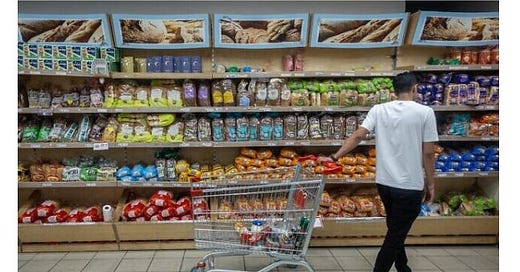Monday July 22 2024: Times of Israel: Food and beverage prices in Israel are 52% higher than OECD average.
Data shows consumer prices in Israel second only to South Korea among 38 developed countries.
Despite their prevalence in Middle Eastern cuisine, the prices of fruit and vegetable in Israel were found to be 25% above the average.
Food and beverage prices in Israel are 52 percent higher than the average among developed countries, second only to South Korea, according to comparative consumer price data released by the Organization for Economic Cooperation and Development in June and reported by Channel 12 News.
Prices for bread and grains in Israel were found to be the among the highest in OECD countries, at 49% above the average, with only Swiss prices coming in higher. Similarly, Israeli prices for dairy and eggs were the second most expensive among the 38 OECD countries, at 64% more expensive than the average, second to South Korea.
While the data showed that there were three countries where meat is more expensive than in Israel, prices in this category were also 64% above the OECD average. The new price data tracks with past OECD reports — Israel ranked first place in a list of developed countries with the highest cost of living in 2022, with prices 38% higher than the member country average.
Some sectors in the Israeli economy suffer from overconcentration, including the food retail sector, as the top three supermarket chains account for over half of the Israeli market, limiting competition and putting upward pressure on prices.
At the same time, import tariffs, regulatory bottlenecks, value-added tax costs and kosher restrictions have been keeping out international retail chains and discounters. In addition, relative high food prices in Israel have been generally attributed to a lack of competition among local importers and manufacturers.
Outside of food and beverages, car prices in Israel were found to be 52% above the average — the highest of any OECD country.
Times of Israel reports that Israel's Value Added Tax, levied on goods and services, is set to rise from 17% to 18% in January 2025 to help the government rein in a ballooning budget deficit amid growing war costs. A planned hike in value-added-tax (VAT) is likely to mainly hurt the poor and worsen inequality in Israeli society, a new report by the Finance Ministry’s chief economist showed.
In less than six months, Israel’s VAT rate is slated to rise from the current 17 percent to 18% as the government is grappling to close a fiscal shortfall of an estimated NIS 70 billion ($19 billion) after almost nine months of war with the Hamas terror group is denting the country’s finances.
VAT is an indirect tax that is collected through the purchase of goods and services, and is not paid directly like income taxes, which are part of direct taxes. VAT in Israel, which is levied on most consumer goods and services, is a regressive tax, meaning that a higher rate harms the lower-income population more than higher earners, and contributes to increasing the already high cost of living in Israel.
In Israel, the bottom decile, the lowest income group of the population, spends 28% of its gross salary on VAT, the second decile spends 18%, and the top decile, or highest earners only 5%, according to the report by the Finance Ministry’s chief economist division.
That is because the lower deciles of the population spend a higher percentage of their salary to buy immediate and basic needs, which in turn reduces their disposable income. In practice, it means that for a similar basket of goods and services, someone with a high income pays less VAT as a percentage of income, than someone from a lower income group.
Finally, many Israeli public transportation users were unpleasantly surprised in June 2024 to find that the price of their trips had already increased when paying using mobile applications, despite reports that the price hikes would kick into gear on July 1 2024.
Price hikes include an increase of 5% for the purchase of monthly passes, according to Israeli media. Single ride prices increased by a higher percentage because they were rounded up to the nearest shekel – from 5.5 ($1.46) to six shekels ($1.60), Channel 12 News reported. The price of rides on the light rail was raised to eight shekels ($2.13).
Public transportation users expressed general frustration with the price increase. “There is not enough improvement [in transportation services] to justify raising prices,” said a Jerusalem resident.
“I could understand the price increase if it included improvements to the public transportation, or even if the Ministry of Transportation were to publish in an organized way what the new prices are and implement it solidly” but neither of these things happened, she added.
“Everything in this country right now is getting more and more expensive and it’s making life really difficult for citizens,” said another disgruntled user. “We are at war and dealing with those pressures, along with increasing prices for everything, are making life really unbearable right now for us,” he added.
Martin Blackham Israel First TV Program www.israelfirst.org





